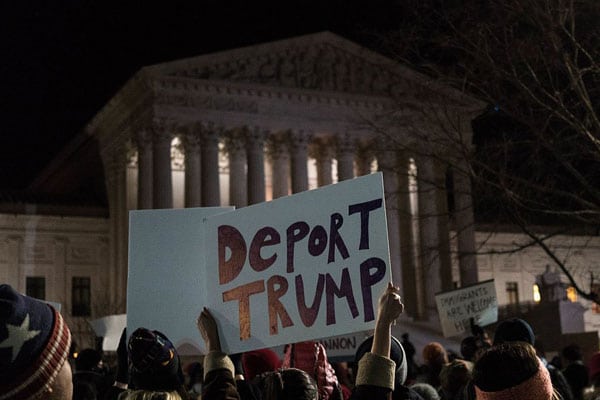
June 26, 2018; New York Times and Washington Post
For those who followed the Supreme Court arguments in Trump v. Hawaii in April 2018, there was little doubt which way the court was leaning. They had already upheld parts of President Trump’s Muslim travel ban, and the sense coming from the courtroom in April was that they were prepared to uphold more. Their decision issued on June 26th did just that. As NPQ wrote before the court heard arguments in this case:
Whatever the ruling, this case has implications for the Supreme Court itself. At stake is whether the courts should consider only the content of a presidential order in making a ruling, or if statements and declarations made in campaigns and elsewhere should be considered. The reach and scope of certain presidential powers are also on the docket with this case.
And that is very much what this 5-to-4 ruling did. The majority focused only on the issue of the presidential order and presidential power to make this kind of ruling. The issue of any statements, tweets, comments, or campaign promises that smacked of anti-Muslim bias were not given consideration in making the determination of the validity of the ban by the five conservative justices who ruled in favor of President Trump.
Writing for the majority, Chief Justice Roberts did acknowledge the president’s frequent mention of the need for a “Muslim ban” to make the country more secure.
“The issue before us is not whether to denounce the statements,” the chief justice wrote. “It is instead the significance of those statements in reviewing a presidential directive, neutral on its face, addressing a matter within the core of executive responsibility.”
“In doing so,” he wrote, “we must consider not only the statements of a particular President, but also the authority of the Presidency itself.”
He concluded that the proclamation, viewed in isolation, was neutral and justified by national security concerns. “The proclamation is expressly premised on legitimate purposes: preventing entry of nationals who cannot be adequately vetted and inducing other nations to improve their practices,” he wrote.
Sign up for our free newsletters
Subscribe to NPQ's newsletters to have our top stories delivered directly to your inbox.
By signing up, you agree to our privacy policy and terms of use, and to receive messages from NPQ and our partners.
The two dissenting opinions, one quite strong by Justice Sotomayor and joined by Justice Ginsburg, and one a bit milder by Justice Breyer, joined by Justice Kagan, both argued that this case was much more than one of presidential powers and authority, but one of religious bias and discrimination. In delivering her dissent, Justice Sotomayor read quote after quote from the president about Muslims and terrorists.
“Let the gravity of those statements sink in,” Justice Sotomayor said. “Most of these words were spoken or written by the current president of the United States.”
She dismissed the majority’s argument that the government made its case that the travel ban is necessary for national security, saying that no matter how much the government tried to “launder” the president’s statements, “all of the evidence points in one direction.”
And in a concurrence with the majority, Justice Kennedy issued a statement that emphasized this nation’s commitment to religious tolerance and the First Amendment. It was almost as though he was reaching out to the four dissenters to say, “I hear you, but I have to stay on this side.”
Many were disappointed—none more so than Neal Katyal, the lawyer who argued the case for Hawaii and others. He issued a challenge to Congress to take up the issue, as they now are the ones who can change this:
“We continue to believe, as do four dissenting justices, that the travel ban is unconstitutional, unprecedented, unnecessary and un-American,” he said. “We decided long ago that America doesn’t exclude people based on nationality or religion alone. . .The travel ban is atrocious policy and makes us less safe and undermines our American ideals. Now that the Court has upheld it, it is up to Congress to do its job and reverse President Trump’s unilateral and unwise travel ban.”
While the outcome in this case was not unexpected, the ramifications for Muslims and those from the nations named in this ban are grim. Young people who wish to study or work in the United States might be wise to look elsewhere. Those who are here and need to go home to see family or for a family emergency may not be able to return. Families seeking to reunify may have a very long wait. For those who might be seeking succor from dire circumstances…this is no longer a place of refuge. Unless Congress acts. And given the difficulty of getting Congress to act on less controversial things, the Muslim travel ban may be with us for quite a while.—Carole Levine












